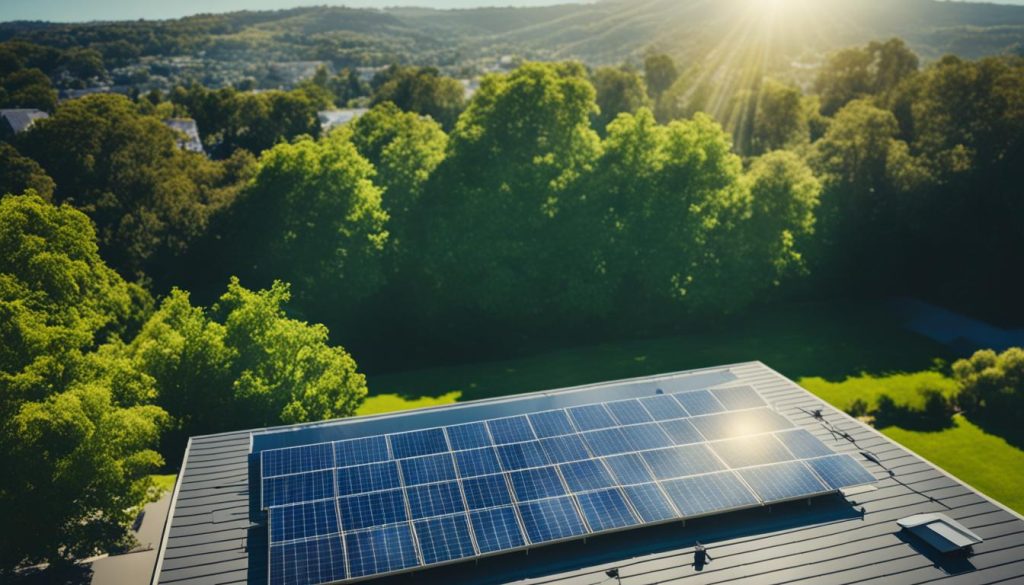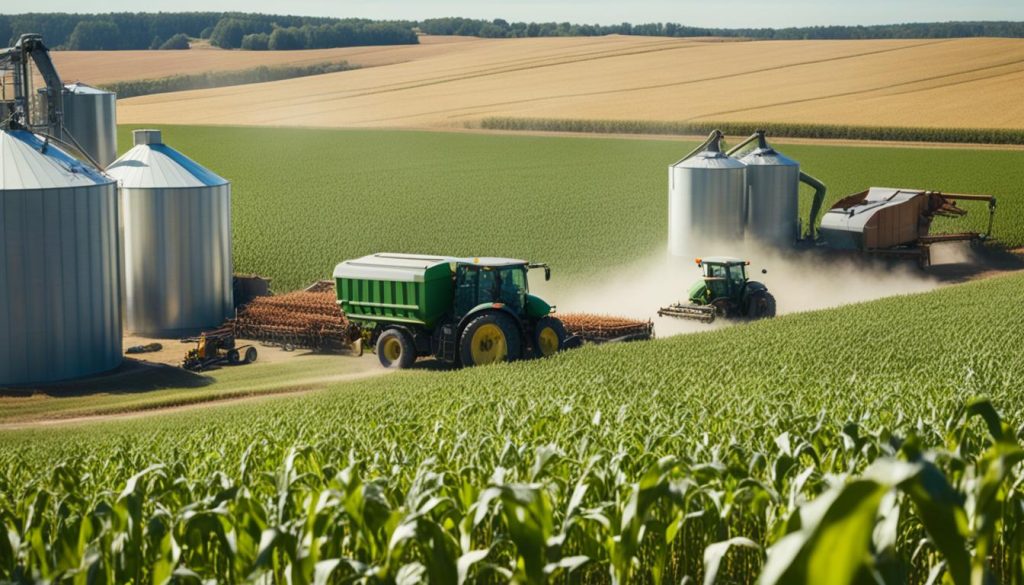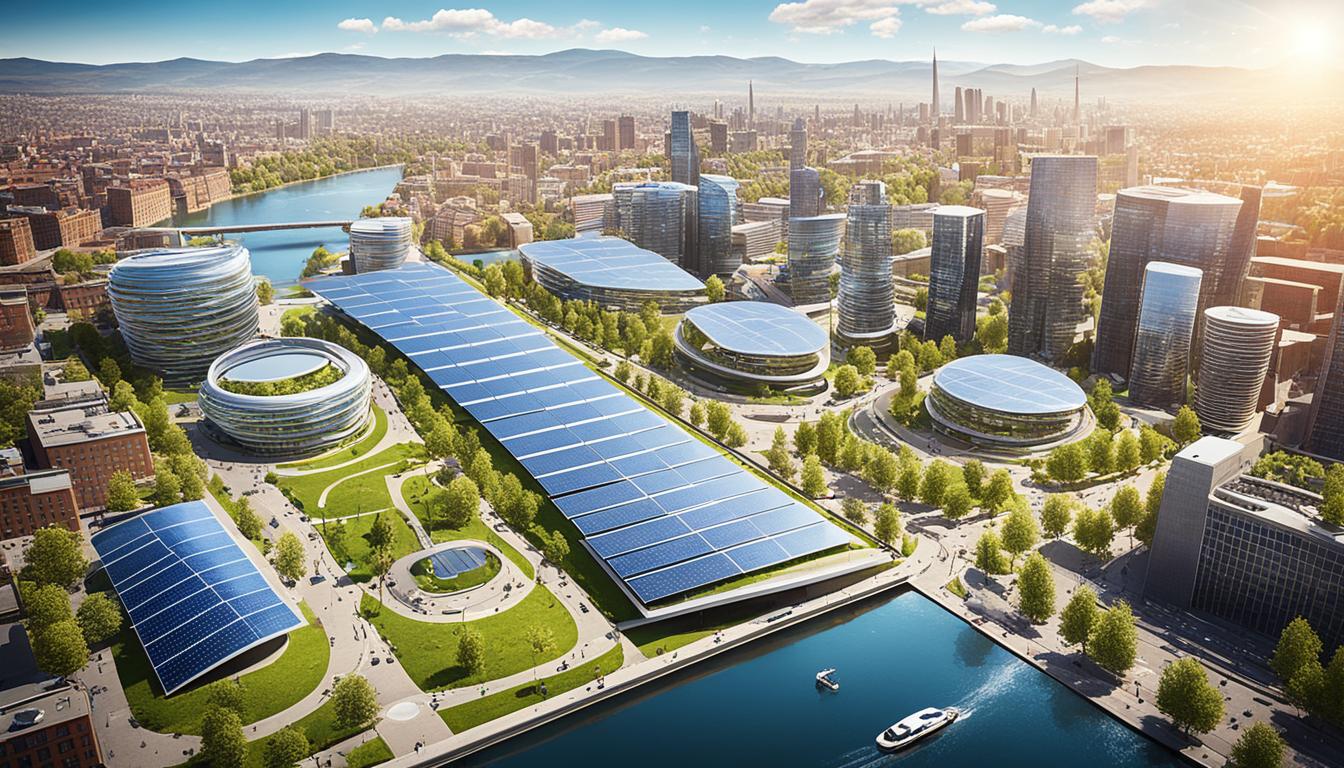I think it’s key to welcome sustainable energy solutions for a better future. Renewable energy sources such as solar, wind, and biofuels give us clean green power. This helps lower our carbon footprint and fights climate change1. With these eco-friendly energy solutions, we can be independent and help our planet be healthier.
Moving to sustainable energy benefits both our planet and our wallets. Renewable energy from solar, wind, and geothermal gives us chances to use less oil. It also means more jobs and new ideas2. Using green power can protect our earth. It also saves money in the long run and gives us financial perks.
The Importance of Sustainable Energy Solutions
Having sustainable energy is key to cut our carbon footprint and battle climate change. It lets us use clean energy technologies that cut the greenhouse gases we make. This change is critical for our environment, economy, and the way we live.
Reducing Carbon Footprints and Greenhouse Gas Emissions
Fossil fuels like coal and oil harm our air and give off a lot of greenhouse gases. Using Environmentally-friendly energy options means making less pollution. This fights climate change and makes our air better345.
- Sustainable energy fights poverty and helps people live better3.
- It cuts down on greenhouse gases, matching the Paris Agreement’s aims3.
- It makes the air cleaner, which is good for health, and saves water3.
Mitigating the Impacts of Climate Change
Fossil fuels have warmed the earth, leading to climate change. Clean energy technologies help because they don’t make much pollution. This lessens climate change and protects our planet5.
“Sustainable energy sources don’t harm public health like fossil fuels do.””5
Fostering Energy Independence
Relying on fossil fuels from other countries is risky. Using environmentally-friendly energy options like solar and wind makes us more independent and safe. This is good for our economy and safety5.
| Energy Source | Sustainability | Emissions |
|---|---|---|
| Fossil Fuels | Finite | High |
| Renewable Energy | Inexhaustible | Low to None |
Using low-carbon energy strategies lessens how much we rely on others for energy. It creates jobs and helps American businesses grow45.
Exploring Renewable Energy Sources

Focusing on renewable energy is key to a clean future. It helps cut our carbon footprint. This lessens the harm of climate change. Renewable systems also boost energy efficiency. They help make our planet greener.
Solar Power: Harnessing the Sun’s Abundant Energy
Solar power is becoming known for being both good for the planet and affordable. It turns sunlight into electricity.
- The cost of solar electricity dropped by 85 percent from 2010 to 2020, making it a great choice6.
- Solar energy could meet the global energy need 1,000 times over, showing its huge potential7.
- In the US, 1% of energy comes from solar power. There is huge room to grown in this area7.
Wind Energy: Capturing the Power of the Wind
Wind power captures wind’s energy with turbines. This creates electricity without pollution. It’s a green choice for the planet.
“The costs of onshore and offshore wind energy fell by 56 percent and 48 percent respectively between 2010 and 2020, further bolstering their economic viability.”6
- Wind farming can happen both on land and at sea. This flexibility means we can use more of this resource8.
- In the US, 2% of energy comes from wind power. There’s great potential for growth7.
- Wind power costs in the US range from $24 to $75 per megawatt-hour. It’s a competitive price7.
Biofuels: Sustainable Fuel Alternatives
Biofuels like biodiesel and ethanol are green options. They are made from plants. They help reduce waste and lessen pollution.
| Biofuel Type | Description | Global Contribution |
|---|---|---|
| Biodiesel | Produced from vegetable oils and animal fats | Less than 2%7 |
| Ethanol | Derived from corn and other plant materials | Less than 2%7 |
Using solar, wind, and biofuels is important. It helps us move away from using up fossil fuels. This lowers the bad effects of climate change6. We need to research and support these solutions. This way, we can build a brighter, greener future687.
Sustainable Energy Solutions for Farms

Choosing sustainable energy benefits farmers and the planet. Solar, wind, and biofuels cut costs, lessen dependence on fossil fuels, and help the environment910.
Solar Panels for Agricultural Operations
Solar power is great for farms. It lowers electricity bills9. The sun’s energy powers farm operations, saving money and our planet10.
“Solar-powered irrigation systems can supply 40 liters of water per minute and collect up to 500 watts of energy per day.”11
The Investment Tax Credit (ITC) lowers taxes for farmers using solar power9.
Wind Turbines: Harnessing Wind Power on Farms
Wind energy is good for farms in windy places. It can store power or sell it9. Wind turbines are eco-friendly and can earn money through power sales10.
- The Rural Energy for America Program (REAP) helps with grants and loans for renewable energy on farms9.
- Big farms can make and sell clean energy to the grid9.
Biofuel Production from Crops
Biofuels, such as biodiesel, are great for farms. They cut fossil fuel use and waste, helping the planet910.
In India, crop waste burning causes pollution. But, experts are finding ways to use the waste for clean energy11. This reduces pollution and saves natural resources10.
By using solar panels, wind turbines, and biofuels, farms save money and help the planet910. There are also many programs and incentives for using renewable energy91110.
The Economics of Sustainable Energy Solutions
Exploring sustainable energy shows a big money-saving opportunity. Using eco-friendly power and working smarter with energy can save a lot. This lets us spend money on other important things12.
Reducing Operational Costs
Turning to eco-conscious energy not only helps the planet. It also cuts spending, which is good for the budget. Choosing solar and wind power over costly traditional options saves money in the long term13.
Financial Incentives and Tax Credits
It’s great that the journey isn’t solo. Helpful federal and state programs offer tax breaks and rebates. These make it easier to choose green technology like wind turbines and solar panels14.
Source Links
- Harnessing Solar Power for a Brighter Sustainable Future
- Harnessing Sustainable Energy and Green Technologies for a Brighter Future | Skill-Lync
- What is sustainable energy and why is it important?
- Why Clean Energy Matters
- What is Sustainable Energy and Why Do We Need It?
- Renewable energy – powering a safer future | United Nations
- Introduction to Renewable Energy
- Exploring Renewable Energy Sources: A Path to Sustainable Future
- Harnessing Renewable Energy: A Sustainable Future for Farming
- Renewable Energy Solutions for Sustainable Farming | Empowering Agriculture
- Three sustainable energy solutions for food production and places where they are used
- Microsoft Word – renewable energy econ module 7-3-14 formatted final.docx
- 4 Economics of Renewable Electricity | Electricity from Renewable Resources: Status, Prospects, and Impediments
- 2024 Sustainable Energy in America Factbook


